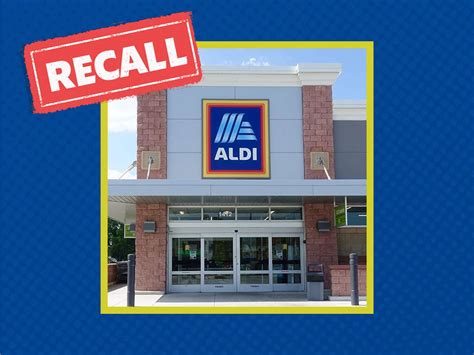
A voluntary recall has been issued for a specific frozen vegetable product sold in Aldi stores across 13 states due to potential Listeria monocytogenes contamination. The affected product is Season’s Choice Frozen Sweet Peas, sold in a 13-ounce bag with a “best by” date of 11/2024 and UPC code 041498615795, according to the U.S. Food and Drug Administration (FDA). Consumers who purchased this product from Aldi stores in Alabama, Delaware, Florida, Georgia, Illinois, Indiana, Kentucky, Maryland, Mississippi, New Jersey, North Carolina, Ohio, Pennsylvania, South Carolina, Tennessee, Virginia, and West Virginia are urged to discard it immediately or return it to the store for a full refund.
The recall, initiated by Aldi’s supplier, underscores the potential health risks associated with Listeria contamination, particularly for vulnerable populations such as pregnant women, newborns, the elderly, and individuals with weakened immune systems. While no illnesses have been reported to date in connection with this specific recall, Listeria infection can cause serious and sometimes fatal infections.
Details of the Recall
The voluntary recall specifically targets Season’s Choice Frozen Sweet Peas in 13-ounce bags. The critical identifier for consumers is the “best by” date of November 2024, printed on the packaging, along with the UPC code 041498615795. Aldi has emphasized the importance of checking freezers and discarding the affected product to prevent potential exposure to Listeria monocytogenes.
Aldi issued a statement emphasizing their commitment to product safety and customer well-being, noting their swift action to remove the product from store shelves upon notification from their supplier. Customers who have purchased the affected product are encouraged to contact Aldi customer service for any questions or concerns regarding the recall or refunds.
The FDA is closely monitoring the recall and working with Aldi and its supplier to ensure the effectiveness of the removal of the contaminated product from the market. The agency is also conducting further investigations to determine the source of the contamination and prevent future occurrences.
Listeria monocytogenes: The Health Risks
Listeria monocytogenes is a bacterium that can cause a serious infection called listeriosis. According to the Centers for Disease Control and Prevention (CDC), an estimated 1,600 people get listeriosis each year, and about 260 die. The infection is most likely to sicken pregnant women and their newborns, adults aged 65 or older, and people with weakened immune systems.
Symptoms of listeriosis can include fever, muscle aches, headache, stiff neck, confusion, loss of balance, and convulsions, sometimes preceded by diarrhea or other gastrointestinal symptoms. In pregnant women, listeriosis can cause miscarriage, stillbirth, premature delivery, or life-threatening infection of the newborn.
Listeriosis is typically treated with antibiotics. Individuals who experience symptoms of listeriosis after consuming the recalled product should seek medical attention immediately and inform their healthcare provider about the potential Listeria exposure. Early diagnosis and treatment are crucial to prevent severe complications.
Preventive Measures and Food Safety Tips
Consumers can protect themselves from Listeria infection by following basic food safety guidelines. These include:
- Wash hands thoroughly: Wash hands with soap and water before and after handling food.
- Separate raw and cooked foods: Use separate cutting boards and utensils for raw meats, poultry, and seafood to prevent cross-contamination.
- Cook foods to safe temperatures: Use a food thermometer to ensure that meats, poultry, and seafood are cooked to the recommended internal temperatures.
- Refrigerate promptly: Refrigerate perishable foods within two hours of purchase or preparation (or within one hour if exposed to temperatures above 90°F, like in a hot car).
- Clean refrigerators regularly: Wipe up spills immediately and clean the refrigerator regularly to prevent the growth of Listeria and other harmful bacteria.
- Be cautious with high-risk foods: Pregnant women, older adults, and people with weakened immune systems should avoid eating certain high-risk foods, such as unpasteurized milk and cheese, raw sprouts, and ready-to-eat meats and poultry.
- Wash raw vegetables and fruits: Rinse fresh produce under running water, even if you plan to peel it. Use a clean produce brush to scrub firm fruits and vegetables.
Aldi’s Response and Customer Information
Aldi has taken swift action to address the potential contamination and ensure the safety of its customers. The company has removed the affected product from store shelves in the 13 states and is working with its supplier to investigate the source of the contamination.
Customers who have purchased Season’s Choice Frozen Sweet Peas with the specified “best by” date and UPC code are advised to take the following steps:
- Check your freezer: Inspect your freezer for the recalled product.
- Do not consume the product: Discard the product immediately in a sealed bag in the trash, or return it to the Aldi store where it was purchased for a full refund.
- Clean your freezer: After discarding or returning the product, clean and sanitize the area where it was stored to prevent any potential spread of Listeria bacteria.
- Monitor for symptoms: If you have consumed the recalled product, monitor yourself for symptoms of listeriosis. If you experience fever, muscle aches, headache, stiff neck, or other symptoms, seek medical attention immediately.
Aldi has also established a customer service hotline and website to provide information and answer questions related to the recall. Customers can contact Aldi customer service for assistance with refunds, product disposal, or any other concerns.
Broader Context of Food Recalls
Food recalls are a common occurrence in the United States, reflecting the complex and interconnected nature of the food supply chain. Recalls can be initiated by food manufacturers, distributors, or retailers, or by the FDA or USDA in response to evidence of contamination or other safety concerns.
Common causes of food recalls include:
- Microbial contamination: Contamination with bacteria, viruses, or parasites, such as Listeria, Salmonella, E. coli, or norovirus.
- Undeclared allergens: Failure to declare the presence of common allergens, such as peanuts, tree nuts, milk, eggs, soy, wheat, fish, or shellfish.
- Foreign object contamination: Presence of foreign objects, such as metal fragments, glass shards, or plastic pieces, in food products.
- Chemical contamination: Contamination with chemicals, such as pesticides, heavy metals, or industrial chemicals.
- Mislabeling: Incorrect or misleading labeling of food products, such as inaccurate nutrition information or ingredient lists.
The FDA and USDA play a crucial role in overseeing food safety and regulating the food industry. These agencies conduct inspections of food processing facilities, monitor food products for contamination, and investigate reports of foodborne illness. They also work with food companies to develop and implement food safety plans and recall procedures.
Impact on Aldi and the Frozen Food Industry
The recall of Season’s Choice Frozen Sweet Peas could have several implications for Aldi and the broader frozen food industry. For Aldi, the recall could result in financial losses due to the cost of removing the product from store shelves, processing refunds, and addressing potential lawsuits. It could also damage Aldi’s reputation and erode consumer trust.
For the frozen food industry, the recall highlights the importance of robust food safety practices and supply chain management. Frozen food manufacturers must implement rigorous quality control measures to prevent contamination and ensure the safety of their products. They must also have effective recall procedures in place to quickly remove contaminated products from the market.
Continuous Improvement in Food Safety
The food industry is constantly evolving, with new technologies and practices emerging to improve food safety. Some of the key trends in food safety include:
- Enhanced testing methods: Development of more sensitive and rapid testing methods to detect contamination early on.
- Improved sanitation practices: Implementation of stricter sanitation protocols in food processing facilities to minimize the risk of contamination.
- Traceability systems: Use of technology to track food products from farm to table, allowing for rapid identification and removal of contaminated products.
- Preventive controls: Implementation of preventive controls to identify and address potential hazards in food production processes.
- Consumer education: Increased efforts to educate consumers about food safety practices and risks.
Conclusion
The voluntary recall of Season’s Choice Frozen Sweet Peas from Aldi stores in 13 states underscores the importance of food safety and the potential risks associated with Listeria contamination. Consumers who have purchased the affected product are urged to discard it immediately or return it to the store for a full refund. By following basic food safety guidelines and staying informed about food recalls, consumers can protect themselves and their families from foodborne illness. Aldi’s quick response and cooperation with regulatory agencies demonstrate a commitment to consumer safety, but the incident serves as a reminder of the ongoing need for vigilance and continuous improvement in food safety practices across the entire food industry. The FDA and other regulatory bodies continue to monitor the situation closely, ensuring that all necessary steps are taken to mitigate the risk and prevent future occurrences. The situation highlights the complexities of modern food supply chains and the challenges involved in maintaining a safe and reliable food supply for consumers. Frequently Asked Questions (FAQ)
Q1: What specific product is being recalled and why?
A1: The product being recalled is Season’s Choice Frozen Sweet Peas, sold in 13-ounce bags with a “best by” date of 11/2024 and UPC code 041498615795. The recall is due to a potential contamination with Listeria monocytogenes, a bacterium that can cause serious illness. Aldi’s supplier initiated the recall as a precautionary measure.
Q2: Which states are affected by this recall?
A2: The recall affects Aldi stores in the following 13 states: Alabama, Delaware, Florida, Georgia, Illinois, Indiana, Kentucky, Maryland, Mississippi, New Jersey, North Carolina, Ohio, Pennsylvania, South Carolina, Tennessee, Virginia, and West Virginia.
Q3: What are the symptoms of Listeria infection (listeriosis) and what should I do if I think I have it?
A3: Symptoms of listeriosis can include fever, muscle aches, headache, stiff neck, confusion, loss of balance, and convulsions, sometimes preceded by diarrhea or other gastrointestinal symptoms. In pregnant women, it can cause miscarriage, stillbirth, premature delivery, or life-threatening infection of the newborn. If you have consumed the recalled product and experience these symptoms, seek medical attention immediately and inform your healthcare provider about the potential Listeria exposure.
Q4: What should I do if I have purchased the recalled Season’s Choice Frozen Sweet Peas?
A4: If you have purchased the recalled Season’s Choice Frozen Sweet Peas, do not consume the product. You should either discard it immediately in a sealed bag in the trash or return it to the Aldi store where you purchased it for a full refund. After discarding or returning the product, clean and sanitize the area where it was stored to prevent any potential spread of Listeria bacteria.
Q5: Is Aldi offering any compensation or assistance to customers affected by this recall?
A5: Yes, Aldi is offering a full refund to customers who return the recalled Season’s Choice Frozen Sweet Peas to the store where they were purchased. Aldi has also established a customer service hotline and website to provide information and answer questions related to the recall. Customers can contact Aldi customer service for assistance with refunds, product disposal, or any other concerns.
Expanded Context and In-Depth Analysis
The Broader Landscape of Listeria Contamination in Food
Listeria monocytogenes is a ubiquitous bacterium found in soil, water, and animal feces, making it a persistent challenge for the food industry. Unlike many other foodborne pathogens, Listeria can grow at refrigeration temperatures, increasing the risk of contamination in ready-to-eat foods that are stored for extended periods. This characteristic makes it particularly concerning for frozen foods, as consumers often assume that freezing completely eliminates the risk of bacterial growth.
Listeria outbreaks have been linked to a wide variety of foods, including deli meats, soft cheeses, ice cream, raw milk, and produce. The severity of Listeria infections varies depending on the individual’s health status, but the infection can be life-threatening, particularly for vulnerable populations.
The Role of Food Safety Regulations and Oversight
The U.S. food safety system is a complex network of federal, state, and local agencies responsible for regulating the production, processing, and distribution of food. The FDA has primary responsibility for regulating most food products, while the USDA regulates meat, poultry, and processed egg products.
The FDA’s Food Safety Modernization Act (FSMA), enacted in 2011, represents a significant shift in the approach to food safety, emphasizing prevention rather than reaction. FSMA requires food companies to implement preventive controls to identify and address potential hazards in their production processes. It also gives the FDA greater authority to inspect food facilities, issue recalls, and detain imported food products.
The USDA’s Food Safety and Inspection Service (FSIS) is responsible for ensuring that meat, poultry, and processed egg products are safe, wholesome, and accurately labeled. FSIS conducts inspections of slaughterhouses and processing plants, monitors food products for contamination, and enforces food safety regulations.
Despite these regulatory efforts, foodborne illness outbreaks continue to occur, highlighting the ongoing challenges of maintaining a safe food supply. Factors contributing to these challenges include the complexity of the food supply chain, the globalization of food production, and the emergence of new foodborne pathogens.
Supply Chain Vulnerabilities and Traceability
The modern food supply chain is a vast and intricate network that spans multiple countries and involves numerous actors, from farmers and processors to distributors and retailers. This complexity makes it difficult to trace food products back to their source and identify the origin of contamination in the event of an outbreak.
Traceability systems are designed to track food products through the supply chain, allowing for rapid identification and removal of contaminated products. These systems typically involve the use of bar codes, RFID tags, or other technologies to track the movement of food products from farm to table.
However, many food companies still lack adequate traceability systems, making it difficult to respond effectively to foodborne illness outbreaks. The FDA is working to improve traceability in the food industry by developing new regulations and guidance documents.
Impact on Consumer Confidence and Brand Reputation
Food recalls can have a significant impact on consumer confidence and brand reputation. Consumers are increasingly concerned about food safety, and a recall can erode trust in a brand and lead to a decline in sales.
Companies that experience a food recall often face significant financial losses due to the cost of removing the product from store shelves, processing refunds, and addressing potential lawsuits. They may also face reputational damage that can take years to repair.
To mitigate the impact of a food recall, companies need to respond quickly and transparently. They should communicate openly with consumers, provide clear information about the recall, and take steps to prevent future occurrences.
The Role of Technology in Food Safety
Technology is playing an increasingly important role in food safety, with new innovations emerging to improve detection, prevention, and response to foodborne illness outbreaks. Some of the key technologies in food safety include:
- Whole-genome sequencing (WGS): WGS is a powerful tool that can be used to identify the source of foodborne illness outbreaks by comparing the genetic fingerprints of bacteria isolated from patients and food products.
- Rapid diagnostic tests: Rapid diagnostic tests can quickly detect the presence of pathogens in food samples, allowing for early intervention to prevent outbreaks.
- Blockchain technology: Blockchain technology can be used to create a secure and transparent record of food products through the supply chain, improving traceability and accountability.
- Artificial intelligence (AI): AI can be used to analyze large datasets and identify patterns that could indicate a food safety risk.
Best Practices for Food Manufacturers and Retailers
To minimize the risk of foodborne illness outbreaks, food manufacturers and retailers should implement the following best practices:
- Develop and implement a comprehensive food safety plan: The plan should address all potential hazards in the production process and include preventive controls to mitigate those hazards.
- Maintain strict sanitation standards: Food processing facilities should be cleaned and sanitized regularly to prevent the growth of bacteria and other pathogens.
- Implement a robust traceability system: The system should allow for rapid identification and removal of contaminated products.
- Train employees on food safety practices: Employees should be trained on proper handwashing, sanitation, and food handling procedures.
- Conduct regular audits and inspections: Food processing facilities should be audited and inspected regularly to ensure compliance with food safety regulations.
- Respond quickly and transparently to food recalls: Companies should communicate openly with consumers, provide clear information about the recall, and take steps to prevent future occurrences.
The Future of Food Safety
The future of food safety will likely be shaped by several key trends, including:
- Increased use of technology: Technology will play an increasingly important role in food safety, with new innovations emerging to improve detection, prevention, and response to foodborne illness outbreaks.
- Greater emphasis on prevention: Food safety regulations will continue to shift toward a more preventive approach, requiring food companies to implement preventive controls to address potential hazards.
- Enhanced traceability: Traceability systems will become more sophisticated, allowing for rapid identification and removal of contaminated products.
- Greater collaboration: Collaboration between government agencies, food companies, and consumers will be essential to improve food safety.
- Increased consumer awareness: Consumers will become more aware of food safety risks and demand greater transparency from food companies.
By embracing these trends and implementing best practices, the food industry can work to ensure a safer and more reliable food supply for consumers. The Aldi recall serves as a crucial learning opportunity, reinforcing the importance of vigilance, robust safety protocols, and swift response in the face of potential contamination. As food safety continues to evolve, the industry must remain committed to continuous improvement and innovation to protect public health. The interconnectedness of global food systems demands a collaborative approach, with stakeholders working together to strengthen food safety measures and build consumer trust.
The incident also highlights the need for continuous education and training for food handlers and processors, ensuring that they are equipped with the knowledge and skills to prevent contamination. Furthermore, investments in research and development are crucial to develop new technologies and strategies to combat foodborne pathogens. By prioritizing food safety and embracing innovation, the food industry can create a more resilient and secure food supply for the future.
The response to the Aldi recall also underscores the importance of effective communication and transparency. Consumers need to be informed promptly and accurately about potential food safety risks so that they can make informed decisions and take appropriate action. Food companies should be prepared to communicate openly and honestly with consumers, providing clear and concise information about recalls and other food safety concerns.
In conclusion, the Aldi recall serves as a timely reminder of the importance of food safety and the need for continuous improvement in the food industry. By embracing technology, prioritizing prevention, enhancing traceability, fostering collaboration, and increasing consumer awareness, the industry can work to ensure a safer and more reliable food supply for all.









